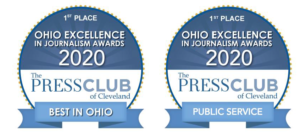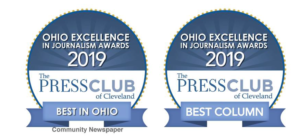In these times when Betsy DeVos, the U.S. Secretary of Education, is devotedly promoting school privatization, f you can make it to Cleveland Heights on October 10, please join us to consider the strengths of public education and the disadvantages of privatizing public schools.
On Tuesday, October 10 at 7 PM, in the auditorium at Cleveland Heights High School (corner of Ceder and Lee Roads), we’ll screen the film, Backpack Full of Cash, from Stone Lantern Films and Turnstone Productions and narrated by Matt Damon. The screening will be followed by discussion.
Sponsoring this free screening is the Heights Coalition for Public Education, in conjunction with the Cleveland Heights Teachers Union, Local 795 AFT; Reaching Heights; the Northeast Ohio Friends of Public Education; the Northeast Ohio Branch, American Association of University Women; and Progress Northeast Ohio.
Public Education is important compared to privatized alternatives merely by its size. In the discussion guide for the film (Touch the thumbnail for the discussion guide.) the education journal Rethinking Schools explains: “There are more than 13,500 public school districts (over 90,000 public schools) serving approximately 50 million students in the United States… There are about 6,800 charters in 44 states and the District of Columbia, serving almost three million students, or… 6 percent of the nation’s public school students…. Roughly 1.3 million students took part in a voucher or voucher-like program in 2017.”
The discussion guide traces the history of charter schools: “Charters first appeared, often with community and teacher union support, in urban districts in the late 1980s and early 1990s… Over the years, the charter school movement has changed dramatically. While there are high-quality individual charter schools, the charter movement has become a national and well-funded campaign organized by investors, foundations, and educational management companies to create a parallel, more privatized school system with less public accountability and less democratic oversight.”
What about the history of vouchers? “The voucher movement can be traced to economist Milton Friedman of the University of Chicago. In 1955, he called for eliminating the funding of public schools and replacing it with universal vouchers…. The first use of vouchers was by white families after the U.S. Supreme Court’s Brown decision. For five years, until federal courts intervened, officials closed the public schools in Prince Edward County, Virginia, rather than desegregate. White parents took advantage of vouchers to send their children to a private, whites-only academy… The first contemporary voucher school program began in Milwaukee, Wisconsin, in 1990.” It was soon followed by the state supported voucher program in Cleveland, Ohio. Voucher programs today also include education savings accounts, and tuition tax credits.
Here are some of the questions our October 10 film screening will address:
- We live in a capitalist country. Why not look to the free market for solutions to challenges in education?
- Is it true, as some say, that charters and vouchers outperform public schools?
- If a school is educating a child, whether it’s a private school or a charter school, doesn’t it deserve public dollars?
- Why shouldn’t we be using public dollars to help some children escape from public schools?
- We have choices in other areas of life. Why not in schools?
- How should we define our civic responsibility to educate all children?
Our screening of Backpack Full of Cash and the ensuing discussion will address timely concerns not only in today’s national context as our U.S. Secretary of Education promotes school privatization, but also in Ohio, where children’s opportunities and our public school funding are threatened by an unregulated charter sector—including out-of-control online academies, in addition to several statewide school voucher programs.
Check out the official trailer for the film.



Leave a Reply